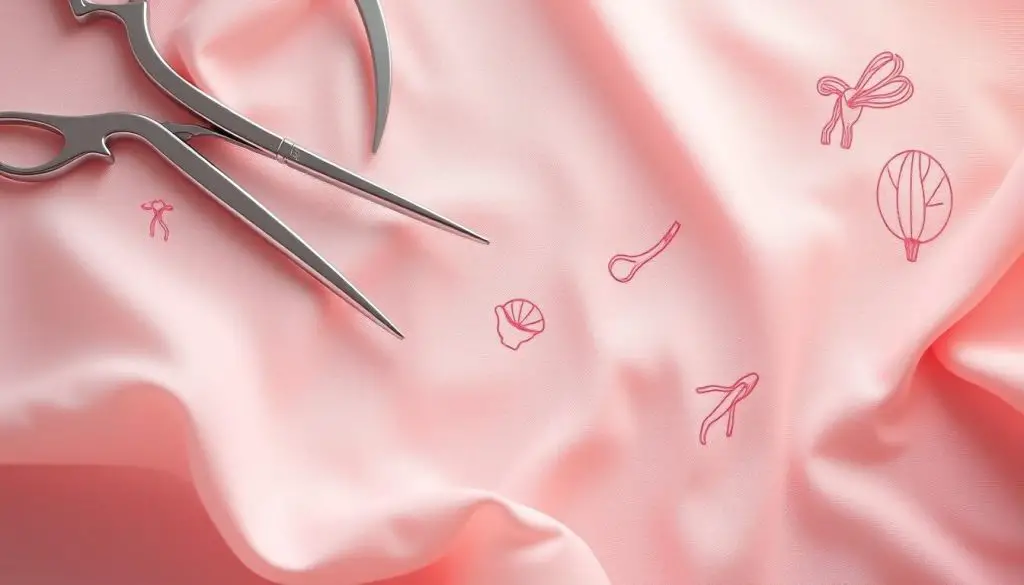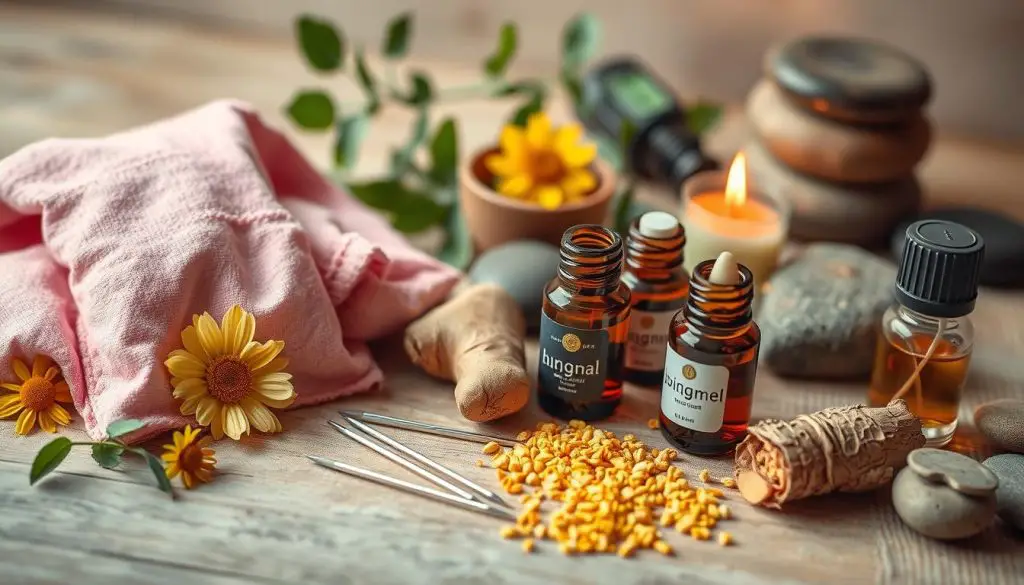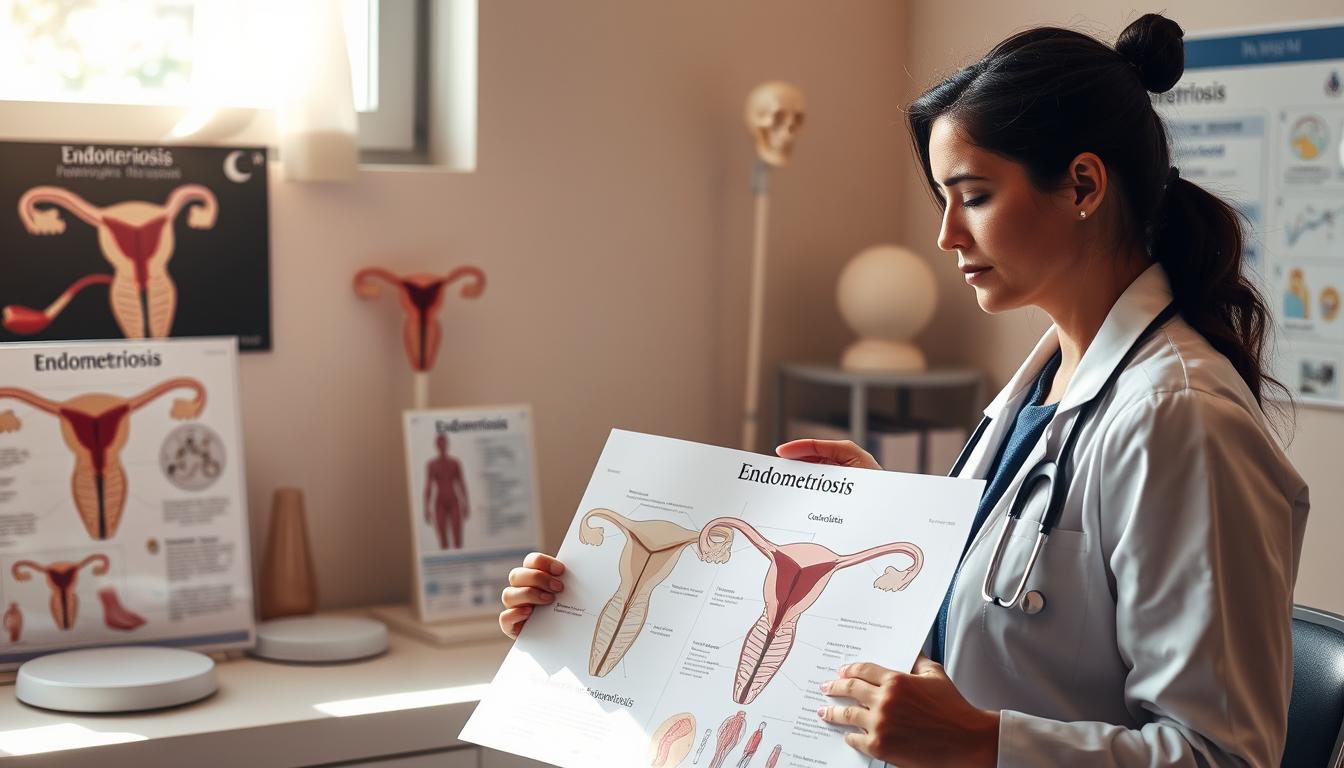If you’re among the millions of women dealing with endometriosis, you know how tough heavy, painful periods can be. The good news is that there are many ways to manage this condition and find relief. You can try dietary changes, herbal supplements, over-the-counter meds, or even minimally invasive procedures. Learn the best ways to handle heavy periods from endometriosis and take back your health.
Research shows that up to 75% of women with endometriosis see big improvements after going gluten-free for a year. Adding foods like turmeric and omega-3s can also help with menstrual cramps and bleeding. If you’re dealing with heavy periods from endometriosis, it’s time to look into the best remedies and improve your life.
Understanding Endometriosis and Heavy Periods
Causes and Symptoms of Endometriosis
Endometriosis is a chronic condition where tissue from the uterus grows outside of it. This misplaced tissue can cause inflammation and scarring. It leads to pelvic pain, heavy menstrual bleeding, and infertility.
Having a family history of endometriosis, short menstrual cycles, and never having children can increase your risk. Symptoms vary greatly. Some people feel intense pain with little tissue, while others with more tissue may not feel pain.
Severe endometriosis can cause bowel or bladder problems, shortness of breath, and chest pain. Knowing the causes and symptoms is key to finding the right treatment.
Diagnosis and Assessment of Heavy Menstrual Bleeding
Diagnosing endometriosis and heavy bleeding involves a detailed medical history and physical exam. Tests like ultrasound, hysteroscopy, or laparoscopy may also be needed. Keeping a diary of your bleeding episodes is often recommended.
A pelvic exam can spot cysts or scar tissue causing heavy periods. Transvaginal ultrasound can show the size and location of endometrial growths. Sometimes, a laparoscopy is needed to confirm endometriosis and rule out other causes.
Understanding the causes and assessing the severity of your heavy menstrual bleeding is vital. It helps create a treatment plan that meets your specific needs.
Dietary Changes to Manage Heavy Periods
If you’re dealing with heavy menstrual bleeding due to endometriosis, changing your diet might help. Focus on eating anti-inflammatory foods, gluten-free options, and omega-3 fatty acids. These can possibly reduce your heavy periods.
Eat more fruits, vegetables, and whole grains. They’re full of nutrients and can help with endometriosis symptoms. Also, try a gluten-free diet as some studies suggest it can help.
Add omega-3 fatty acids to your diet. Foods like fatty fish, walnuts, and flaxseeds are good sources. They have anti-inflammatory effects. But, cut down on red meat, dairy products, and processed foods as they can make symptoms worse.
Some suggest an elimination diet to find out which foods bother you. Watch your symptoms and remove foods that seem to trigger them. This way, you can adjust your diet to better manage your heavy periods.
| Anti-Inflammatory Foods | Foods to Limit |
|---|---|
|
|
Keep in mind, everyone’s body is different. So, work with your healthcare provider to create a diet plan that’s right for you. This will help manage your heavy periods effectively.
Herbal Supplements and Natural Remedies
Women with heavy periods due to endometriosis may find relief in natural remedies and herbal supplements. Turmeric, a spice, is known for its anti-inflammatory effects. It may help ease menstrual cramps, a common problem for those with endometriosis. Omega-3 fatty acids, found in foods like walnuts and fatty fish, can also help reduce menstrual flow and improve reproductive health.
CBD oil is another natural option being explored for its pain-relieving properties. It may help with endometriosis-related pain and inflammation. Some women have found it helpful in managing menstrual discomfort and heavy bleeding.
| Herbal Remedy | Potential Benefits |
|---|---|
| Turmeric | Anti-inflammatory properties, relief for menstrual cramps |
| Omega-3 Fatty Acids | Reduced menstrual flow, improved reproductive health |
| CBD Oil | Alleviation of pain and inflammation associated with endometriosis |
While these natural remedies may offer relief, it’s important to talk to a healthcare professional before using them. By combining conventional and complementary approaches, you can manage heavy periods and endometriosis more effectively.
Over-the-Counter Pain Relief Options
Managing heavy periods and menstrual cramps from endometriosis can be tough. Ibuprofen (Advil, Motrin) and naproxen (Aleve) are two OTC choices that help. They reduce inflammation and ease pain.
But, always talk to your doctor before using OTC meds for a long time. They can help with the right dose and make sure they’re safe for you, even with other health issues.
There are also natural ways to help with heavy periods and cramps from endometriosis. These include:
- Herbal supplements like turmeric and omega-3 fatty acids
- Eating more iron-rich foods and drinking plenty of water
- Practicing yoga and meditation to handle stress and pain
- Using heat therapy, like a heating pad or warm bath, to ease cramps
Talking to your healthcare provider about these options is key. They can help find the best way to manage your endometriosis symptoms.
Hormonal Treatments for Heavy Bleeding
For those with heavy periods due to endometriosis, hormonal treatments can help. Oral contraceptives can regulate menstrual cycles and reduce bleeding. They thin the uterine lining, which decreases menstrual flow.
Oral Contraceptives and Hormonal IUDs
Hormonal intrauterine devices (IUDs) are also effective for heavy periods. They release progestin, which reduces menstrual blood loss and eases endometriosis symptoms.
Healthcare providers can choose the best hormonal therapy for you. Some find combination birth control pills or a hormonal IUD work best for managing symptoms.
| Treatment Option | Effectiveness in Reducing Heavy Bleeding |
|---|---|
| Oral Contraceptives | Moderately effective, with combination pills being more effective than progestin-only pills |
| Hormonal IUDs | Highly effective, often more so than oral contraceptives or NSAIDs |
| Endometrial Ablation | Effective, but some women may require repeat procedures due to heavy periods |
| Hysterectomy | Considered the most effective method, but more invasive with possible complications |

Hormonal treatments can greatly help with heavy bleeding. But, they might affect a woman’s ability to get pregnant. Those worried about fertility should talk to their doctor. This way, they can manage symptoms and keep future reproductive plans in mind.
Non-Hormonal Medications for Heavy Periods
For those who can’t or don’t want to use hormonal treatments, there are other options. Antifibrinolytic drugs like tranexamic acid and GnRH are two types of non-hormonal medications. They help manage heavy periods caused by endometriosis.
Antifibrinolytic Drugs and GnRH Therapies
Tranexamic acid can cut down menstrual blood flow by up to 60%. It stops blood clots from breaking down, reducing bleeding. NSAIDs like ibuprofen and naproxen can also help, cutting bleeding by 20-50%.
GnRH therapies lower estrogen levels. This stops the uterine lining from thickening and shedding. It can greatly reduce heavy menstrual bleeding. GnRH agonists and antagonists are two types used for endometriosis.
Non-hormonal treatments are great for women trying to get pregnant. They don’t affect fertility like hormonal treatments do.
| Treatment | Success Rate in Reducing Bleeding |
|---|---|
| Tranexamic Acid | 60% |
| NSAIDs (ibuprofen, naproxen) | 20-50% |
Understanding non-hormonal options helps women find the best treatment with their healthcare providers. It’s all about finding what works best for each individual.
Minimally Invasive Procedures
Women with heavy periods due to endometriosis have several options. High Intensity Focused Ultrasound (HIFU) and Uterine Artery Embolization (UAE) target uterine fibroids. These are common causes of heavy bleeding.
High Intensity Focused Ultrasound (HIFU)
HIFU is a non-invasive method. It uses ultrasound waves to heat and destroy fibroids. This treatment is done as an outpatient, under local anesthesia, and takes 2-3 hours.
Many women see a decrease in fibroid size and bleeding after HIFU. This happens within a few months.
Uterine Artery Embolization (UAE)
UAE blocks the blood supply to fibroids, causing them to shrink. A small incision in the groin allows a thin catheter to reach the uterine arteries. Small particles block blood flow, treating the fibroids.
Women often report less heavy bleeding and symptoms after UAE. These endometriosis treatments are good for those wanting relief without surgery. Always talk to a healthcare provider about risks and benefits.

Surgical Options for Endometriosis and Heavy Periods
For severe or treatment-resistant endometriosis and heavy bleeding, surgery might be needed. This could include myomectomy (removing uterine fibroids), endometrial ablation (destroying the uterine lining), or hysterectomy (removing the uterus). The right choice depends on symptoms, health, and fertility plans.
Endometrial resection or ablation helped 89 out of 100 women have lighter periods a year later. Women who had a complete hysterectomy stopped having periods a year after. But, hysterectomies led to more complications like infections and fever for 32 out of 100 women, compared to 6 out of 100 with endometrial resection.
Hysterectomies improved health and reduced pain more than endometrial resection. Yet, they caused more emotional issues after surgery. About 75 out of 100 women were happy with their treatment two years later, no matter the surgery.
Most endometriosis cases are not seen on scans. Laparoscopy can show where and how big the growths are. MRI helps plan surgery for endometriosis.
When meds don’t work, surgery like myomectomy, endometrial ablation, or hysterectomy might be an option. The choice depends on what each person needs and wants, with their doctor’s help.
heavy periods remedies
If you’re dealing with heavy periods because of endometriosis, there are home remedies to help. You can try dietary changes and herbal supplements. Also, making simple lifestyle changes can manage menorrhagia symptoms.
Heat therapy is a good remedy. Using a heating pad or hot water bottle on your lower abdomen relaxes the uterine muscles. This can reduce cramping and pain from heavy periods. Pelvic massage by a trained professional also helps by improving blood flow and reducing inflammation.
Resting well is key on heavy flow days. Try to relax and avoid hard activities that worsen symptoms. Light exercise, like walking or gentle yoga, can help by improving circulation and releasing endorphins.
While these home remedies offer relief, it’s vital to work with your healthcare provider. They can help manage your endometriosis and heavy menstrual bleeding. They’ll create a treatment plan that addresses the root causes and offers long-term solutions.
| Home Remedy | How It Helps |
|---|---|
| Heat Therapy | Relaxes uterine muscles, reduces cramping and pain |
| Pelvic Massage | Improves blood flow, reduces inflammation |
| Rest | Allows the body to recover and conserve energy |
| Light Exercise | Improves circulation, releases endorphins to alleviate discomfort |

Lifestyle Modifications and Pain Management
Making lifestyle changes can help manage heavy periods and endometriosis symptoms. One good option is heat therapy. A warm bath or heating pad can relax pelvic muscles and ease menstrual cramps.
Also, focusing on pelvic rest and gentle exercise can help. While avoiding hard activities during your period is key, light activities like walking or yoga can improve circulation and lessen pain.
Heat Therapy, Rest, and Light Exercise
To tackle heavy periods and menstrual cramps from endometriosis, try these holistic methods:
- Take warm baths or use a heating pad on your lower abdomen to soothe cramps and relax the pelvic muscles.
- Prioritize pelvic rest during your period, allowing your body to recover and minimize discomfort.
- Engage in gentle exercise such as walking, yoga, or swimming to improve circulation and reduce pain.
By adopting these simple lifestyle changes, you can manage endometriosis symptoms. This includes finding relief from heavy periods and menstrual cramps.
Integrating Traditional and Complementary Approaches
Some people with endometriosis find relief by using traditional and complementary methods. They might try traditional Chinese medicine like herbal remedies and acupuncture for heavy periods. These methods are used along with treatments from their doctors.
Hospitals now offer complementary and alternative medicine (CAM) therapies. Health maintenance organizations (HMOs) are covering more CAM therapies. More doctors are using these methods in their practices.
Insurance for CAM therapies is getting better. Centers for integrative medicine are popping up. They often work with medical schools and hospitals.
Clinical trials are key in testing new treatments, like CAM therapies. They check if these treatments work and are safe. Research studies and trials help prove new treatments are good.
People want treatments that work and have good results. Studies show integrative endometriosis treatments can help. As more research comes out, using these methods will likely grow.

Seeking Professional Help and Support
When to Consult a Healthcare Provider
If home remedies and over-the-counter treatments don’t help, see a healthcare provider. They can check you thoroughly and find the cause. Then, they’ll suggest the best treatment, which might include medicines, small procedures, or surgery.
See an endometriosis specialist or your gynecologist if you notice these signs:
- Your heavy periods last longer than 7 days
- You need to change your tampon or pad every hour or less
- You pass blood clots larger than a 50-cent coin
- Your heavy bleeding interferes with your daily activities
- You have persistent pelvic pain or discomfort
- You are experiencing symptoms of anemia, such as fatigue or dizziness
Your healthcare provider will do tests like blood tests and ultrasound scans. These help find the cause of your heavy periods. They’ll then create a treatment plan that might include medicines, small procedures, or surgery.
Getting professional help and working with your healthcare provider is key. It helps manage heavy periods due to endometriosis and keeps you healthy. Don’t wait to make an appointment if your symptoms get worse or don’t go away.
Coping Strategies and Emotional Well-Being
Dealing with endometriosis and heavy periods can really affect your mood. It’s key to take care of yourself and find support. This can help with stress, anxiety, and depression. Try mindful meditation, which studies show can lessen pain, anxiety, and sadness.
Adding yoga to your day can also help. A 2016 study showed yoga can ease menstrual pain and improve health in women with PMDD. Getting enough sleep is also important. Lack of sleep can make you feel irritable and tired.
If you’re really struggling emotionally, talk to your doctor. They might suggest antidepressants or other help for your mental health. Remember, you’re not alone. There are ways to cope and take care of your emotional health.
Source Links
- https://www.medicalnewstoday.com/articles/321402
- https://utswmed.org/conditions-treatments/heavy-bleeding-and-painful-periods/
- https://www.webmd.com/women/heavy-period-causes-treatments
- https://my.clevelandclinic.org/health/diseases/10857-endometriosis
- https://www.mayoclinic.org/diseases-conditions/endometriosis/symptoms-causes/syc-20354656
- https://www.medicalnewstoday.com/articles/325965
- https://www.thewomens.org.au/health-information/periods/healthy-periods/exercise-diet-periods
- https://www.spirehealthcare.com/health-hub/specialties/womens-health/how-to-stop-heavy-periods/
- https://www.ncbi.nlm.nih.gov/pmc/articles/PMC2077876/
- https://www.pippacampbellhealth.com/blog/5-herbs-for-heavy-periods/
- https://www.toplinemd.com/novac-md/natural-treatment-options-for-heavy-periods-menorrhagia/
- https://www.healthline.com/health/how-to-stop-heavy-periods
- https://www.healthline.com/health/womens-health/menstrual-cramp-remedies
- https://www.mayoclinic.org/diseases-conditions/menstrual-cramps/diagnosis-treatment/drc-20374944
- https://www.ncbi.nlm.nih.gov/books/NBK279293/
- https://www.ncbi.nlm.nih.gov/pmc/articles/PMC4728737/
- https://patient.info/womens-health/periods-and-period-problems/heavy-periods-menorrhagia
- https://www.wearwhiteagain.co.uk/treating-heavy-periods/non-hormonal-therapy/
- https://www.medanta.org/patient-education-blog/exploring-hormonal-and-non-hormonal-treatments-for-menstrual-disorders
- https://www.fda.gov/medical-devices/surgery-devices/endometrial-ablation-heavy-menstrual-bleeding
- https://www.pwcswfl.com/blog/heavy-periods-can-be-stopped-with-minimally-invasive-treatment
- https://www.ncbi.nlm.nih.gov/books/NBK435697/
- https://www.mayoclinic.org/diseases-conditions/endometriosis/diagnosis-treatment/drc-20354661
- https://www.cdc.gov/female-blood-disorders/about/heavy-menstrual-bleeding.html
- https://www.health.com/condition/menstruation/heavy-periods
- https://www.healthpartners.com/blog/what-causes-heavy-periods-and-how-to-stop-them/
- https://www.houstonmethodist.org/blog/articles/2021/sep/menstrual-cramps-5-tips-for-getting-relief-from-period-pain/
- https://www.healthdirect.gov.au/managing-period-pain
- https://www.ncbi.nlm.nih.gov/books/NBK83807/
- https://www.ncbi.nlm.nih.gov/pmc/articles/PMC8272670/
- https://www.nature.com/articles/s41598-023-29921-1
- https://myhealth.alberta.ca/Health/aftercareinformation/pages/conditions.aspx?hwid=uh4126
- https://www.healthdirect.gov.au/heavy-periods
- https://www.healthline.com/health/womens-health/pmdd-natural-treatment
- https://www.uptodate.com/contents/heavy-periods-beyond-the-basics
